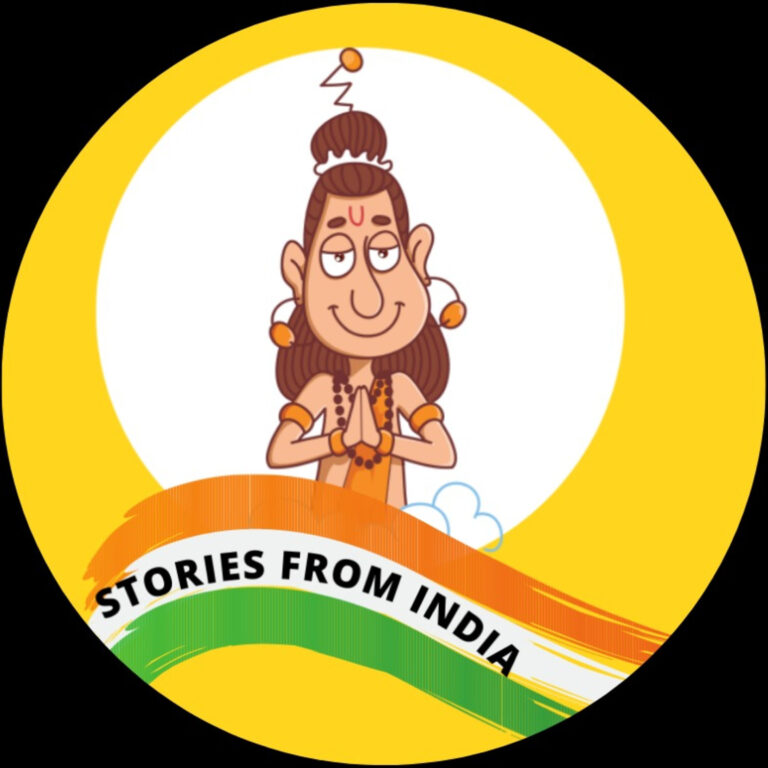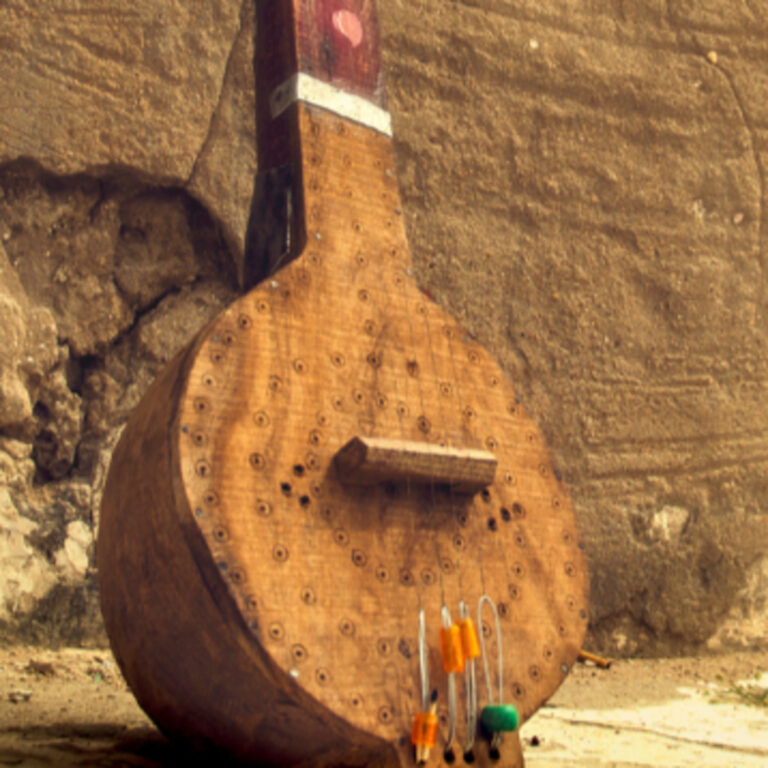A story from history about Purandara Dasa, a Scrooge-like diamond merchant whose meeting with Vishnu changed him to the extent that he gave it all away and became a composer and singer, ultimately becoming the grandfather of Carnatic music

I’m the host Narada Muni, and I’m a mythological character myself!
I have the gift of eternal life, and knowledge of the past, the present, and the future. I’m also the son of Brahma, the creator of the Universe. By profession, I’m a traveling musician and storyteller, so the way I’m doing my job is by podcast.
In every episode, I’ll bring you Stories from India from well known Indian Mythological epics like the Ramayan and Mahabharata, to folklore including the Panchatantra, Jataka Tales, Vikram and Betaal, Akbar and Birbal, Tenali Raman, and many other regional folk tales!
A story from history about Purandara Dasa, a Scrooge-like diamond merchant whose meeting with Vishnu changed him to the extent that he gave it all away and became a composer and singer, ultimately becoming the grandfather of Carnatic music
Transcript and show notes: https://sfipodcast.com/history-purandara-dasa-ep-238/
Music: https://www.purple-planet.com
#sfipodcast #PurandaraDasa #Purandara #Purundara #PurundaraDasa #Vishnu #Carnatic #CarnaticMusic #IndianHistory #HistoryOfIndia
—
Send in a voice message: https://podcasters.spotify.com/pod/show/storiesfromindia/message


Welcome to “Stories From India”. This is a podcast that will take you on a journey through the rich mythology, folklore and history of the Indian subcontinent. I am Narada Muni, the celestial storyteller and the original “time lord”. With my ability to travel through space and time, I can bring you fascinating stories from the past, the present, and the future. From the epic tales of the Mahabharata and Ramayana to the folktales of the Panchatantra to stories of Akbar-Birbal and Tenali Raman, I have a story for every occasion.
The purpose of the stories is neither to pass judgment nor to indoctrinate. My goal is only to share these stories with people who may not have heard them before and to make them more entertaining for those who have.
Today’s Story
In this episode, we’re talking about Purandara Dasa, who was the grandfather of Carnatic music. I had originally intended to cover both Purandara Dasa and Kanaka Dasa in today’s episode, but I worried that the episode would become rather long. So this is just Purandara Dasa’s story, and we’ll cover Kanaka Dasa in a separate episode
Purandara Dasa wasn’t born Purandara Das. His name at the time was Srinivasa Nayaka. Srinivasa is one of Vishnu’s many names. Now I know what some of you are thinking. Musician, Vishnu devotee, could Purandara Das really be an avatar of me, Narada? If you thought that you wouldn’t be the first one. After you’ve heard today’s story you can judge for yourself if Purandara Dasa/Srinivasa Nayaka was really me in disguise.
Many contend that Srinivasa Nayaka was born in Thirthahalli, so let’s use that name.
Srinivasa’s father was a diamond merchant. Which was quite a respectable and lucrative position back in the 15th century as well. That meant Srinivasa Nayak’s lifestyle was a cut above the rest of his schoolmates. Attending rock concerts in the VIP section was a regular weekend activity for the boy. The 15th century version of a rock concert was a gathering of diamond merchants appraising the value of rocks. Srinivasa Nayaka often imagined that all these rock concerts might go a lot better if there were loud music, light effects and such to go with the crowd that was oohing and aahing every time a new number was unveiled on stage.
When the boy grew older, he got married. The close-knit society of diamond merchants had this sort of internal matchmaking app – which they called carbon dating. And so Srinivasa Nayaka married Saraswati Bai. He gave her a diamond ring. Twenty carats. He expected her to wear the ring, and to use the carrots to make a creative side dish for dinner that night.
The girl was a very devoutly religious person and that’s going to be important later in the story. For now, she made no impression on Srinivasa Nayaka other than as a means to an end. Because all the boy cared about was wealth.
Don’t get me wrong – Srinivasa Nayaka was brilliant, there was no doubt about it. But the way he prioritized money over everything else could be considered a deep flaw, and unlike how it happened sometimes with his diamonds, this flaw did not increase his value. His single minded pursuit of wealth might remind you of Scrooge McDuck. For clarity, Srinivasa Nayaka didn’t own an insanely packed money bin that he could swim in. He merely dreamt of owning such a bin. Meanwhile he afforded himself luxuries like diamond studded shoes which left a substantial carbon footprint.
In keeping with his Scrooge McDuck characterization, when giving Saraswati Bai a gift, he was sure to demand a receipt. For tax purposes. Diamonds are a girl’s best friends, just as tax returns were his.
When Srinivasa Nayaka took over complete control of his family business after his father retired, it was completely on-brand for him to open a pawn shop. Diamonds are forever, he explained. Which meant there was a market for second hand diamonds, without too much of a depreciation in their value.
One day, Navakoti Nayaka, as he was called now, was walking home from making another million rupees. He could probably have owned, or at least hired a luxury chariot. But no, a rupee saved is a rupee and interest earned. That’s when he met a new beggar. He had never seen this beggar before, and he knew all the ones on this street. Maybe the beggar was a recent victim of a bankruptcy. His face had this sparkle about it. And yet, this beggar was obviously penniless. The rags he was wearing had no pockets left for him to conceal any money. Navakoti Nayaka had already begun analyzing the next beggar on the street, when the beggar tugged at his sleeve.
“Sir, I need your help.” the beggar asked.
The diamond merchant should have been annoyed at this direct approach but he was intrigued. The beggar explained that he needed money for his son’s Upanayana. That word, if you haven’t heard it before, means an initiation ceremony that signifies that a child is ready to leave home and begin life as a student. It’s an important, life shaping event. So it was easy to see why the beggar was stressed about it.
But Navakoti Nayaka had no sympathy. “So, you’re just expecting a handout? No sir, go pull yourself up by your bootstraps. If you have any bootstraps”
The beggar was disappointed and walked away. Navakoti Nayaka similarly told off a few more beggars and therefore it took him a while to get home. But something interesting had happened. The beggar had reached the diamond merchant’s home first. And repeated his plea this time to Saraswati Bai. Saraswati as I mentioned was a devoutly religious person. She believed that the beggar’s son absolutely needed help and she was ready to provide it. Even though she had no access to money, she did have her jewels. Instantly, the kind lady took off her nose ring and gave it to the beggar. The beggar went away happy. The nose ring would cover the cost of the Upanayana and feed them besides.
You can see that Navakoti Nayaka took his job of scolding beggars very seriously, because he didn’t get home until long after the beggar had left. That is something Scrooge McDuck might not have done. Anyway, the diamond merchant and pawnshop owner did notice that night that his wife was missing her nose ring, but he didn’t ask her. He didn’t care whether she chose to wear it or not.
But he did care immensely the next day. Because guess what Navakoti Nayak’s assistant at the pawn show brought in to show him? It was a nose ring identical to the one Nayaka had gifted his wife. The person who had pawned it had already left with his money. The assistant explained that he brought this to Nayaka because he had noticed an inscription. Only seen using a jeweler’s eyepiece. It clearly said “To my dearest wife, Saraswati Bai, from Srinivasa Nayaka”. Don’t ask how jewelers managed to fit all that onto such a tiny ring, they were just awfully clever.
A cautious, calm thinking person might have rationalized there could be another Srinivasa Nayaka married to another Saraswati Bai had gifted his nose ring to her. After all, Srinivasa Nayak’s shop hadn’t patented the design. But Navakoti Nayaka was not cautious or calm at this moment.
When the assistant described the man who brought in the nose ring, Navakoti Nayaka was shocked to realize that he recognized him as the beggar from yesterday. The diamond merchant was upset, and anxious.
He didn’t bother to wonder why the beggar was impinging on his life at multiple points. The beggar could have asked Saraswati Bai first, or the beggar could have taken the ring to a different pawnshop – though this last part he could understand. Navakoti Nayaka’s pawnshop was the best in town. “Our business is what you don’t need – guaranteed best rates. We price match”.
Navakoti Nayaka rushed home and confronted his wife. Where exactly was her nose ring, he demanded to know. Saraswati Bai knew her game was up. If there’s one thing her husband hated more than giving to charity, it was his non-earning family members giving to charity.
There was no way out for her now. She had already been under considerable stress since being married. Her husband didn’t care to spend any time with her or their kids. But what was absolutely the worst was that he didn’t care about her deeply religious feelings. It would be quite a stretch to say that he didn’t believe in god. It was more likely that he didn’t think God had any influence on his life.
And how confronted by a facet of his personality that she had never seen before: murderous rage. She decided to do one last favor to her husband. She would sacrifice herself in a way that would not allow the blame to fall on Srinivasa Nayaka. She calmly walked out and walked back in with a cup.
“I asked you to bring me your nose ring. Not a glass of water”
But it wasn’t a glass of water. Saraswati Bai was ready to exit the world, and this glass was her exit ticket. She didn’t seem to hear her husband screaming about the beggar, about betraying his trust, about the price of nose rings. She calmly lifted the glass to her lips and drank it. Funny that the poison tasted just like water. And oh, what was that? There was something in the glass. Saraswati Bai was glad she didn’t drink it in a hurry. She might have choked on that solid object at the bottom of the glass, not realizing the irony. What was the thing anyway? It was small, it was circular. It was a ring! A nose ring. Her nose ring. As she triumphantly waved the nose ring in her husband’s face, she should have worried about the effect of the poison, but she didn’t. No wonder the poison had tasted like water. It had turned into water. Vishnu, the preserver of the Universe, had decided to preserve her life. She was completely convinced of that.
Shockingly, Navakoti Nayaka was also completely convinced that Vishnu had intervened. A force that could change poison to water, and a force that could materialize a duplicate identical nose ring into the same cup. Now it made sense to him why the beggar had three times intersected his own life. The beggar was Vishnu himself, in disguise. This was all an elaborate plan to show him the error of his ways. Scrooge McDuck didn’t have much of a transformative moment, but Ebenezer Scrooge from “A Christmas Carol” did. And that is sort of how Navakoti Nayak’s transformation into Purandara Dasa happened, at the beginning before dramatically ramping up.
Purandara Dasa gave away all the money he had earned as a diamond merchant. Which disrupted the local economy for a short while, but ultimately massively boosted the quality of life of everyone in town. Not saying the situation is the same, but if any modern day billionaires were to try following in Navakoti Nayaka’s footsteps, it might not be such a bad idea for the rest of the country.
Purandara Dasa didn’t stop at that. He decided that from now on, he was going to do only one thing. Spread the word about Vishnu. Maybe he could have made his case to his wife before taking such a massive decision, but that would have been preaching to the choir. Saraswati Bai was thrilled that her husband had changed his tune, and she was ecstatic about the idea of devoting their lives to spreading knowledge of Vishnu.
Purandara Dasa did get some resistance from his four kids. Their thoughts were out of tune, as his newly minted musical self thought about it. His oldest son pointed out that the only way for a musician to become a millionaire was if they started out as a billionaire.
Taylor Swift may beg to differ, but that was a fair point in medieval India. As the joke goes, the difference between a musician and an extra large pizza is that the extra large pizza can feed a family of 6.
Patiently, the diamond merchant-turned-singer explained that devotion to Vishnu was more important than their immediate material needs. All they had to do was sing praises of Vishnu, in song form!
“But we don’t even know how to sing,” the second son protested.
That was easily fixed. Purandara Dasa and Saraswati Bai got out their veena and tambura, ancient Indian musical instruments, and began “Let’s start at the very beginning. A very good place to start. When you read you begin with ABCs, when you sing you begin with Sa re ga ma…” but you know the rest.
That’s all for now
Some notes on the show
Purandara Dasa broke all kinds of records. Not as in breaking physical records of other musicians as some modern, vain so called artists may be doing, but breaking metaphorical records. By the time of his death in 1564, he had written around 475000 songs and compositions! That day in history lays a strong claim to the title of “the day the music died”
And in counting 475000 songs, I am not including “Purandara’s version” re-released and re-mastered albums, but I do include all the songs from his mental vault. That number is the highest in recorded history, by a huge margin, and especially remarkable if you consider that he got such a late start. No wonder he was considered the Grandpa of Carnatic music.
And all of that was selflessly devoted to Vishnu. Purandara Dasa developed some strong views against casteism, against untouchability and for gender equality that are a lot closer to modern thinking than most of his contemporaries, as well as several future generations.
There’s plenty of debate about where Purandara Dasa was born, but it doesn’t really matter whether the place he was born in was in what is now Karnataka or what is now Maharashtra. Let’s just say that he had an impact on a pretty big part of India.
That’s all for now.
Next Time
In the next episode, we’ll go back to the Mahabharata. It’s been a while since we covered the Mahabharata, and this time we’ll finally see the introduction of one of the central characters in this great epic. I’m talking about Draupadi.
Feedback
Thank you all for the comments on Social Media and on Spotify’s Q&A! I can’t directly reply to the questions there, but I’ll address them here on this show.
Thank you Deepinjoy for your comments on some of my earlier episodes.
Shalu – thank you as always for your encouragement and support.
Hiranmayee, Samay, Prasanna, loved your comments, thank you!
Happy new year to you as well Hiranmayee, Mushroom, Darsh, and all of you listeners
Samay – A folktale from Uttar Pradesh will be coming up soon-ish.
Dweerferr, Pikachu Master 0025, you both and a few others are getting your wish. Mahabharata is coming up next week.
Aravindacharya, I have to see if I can continue Kalki’s story without revealing too much. It’s the standard time traveler’s dilemma that I constantly have to grapple with.
Bala, yes – Devs and Asura origin story is lined up, and will be coming soon.
If you have any other comments or suggestions or if there are particular stories you’d like to hear, please do let me know by leaving a comment or a review on the site sfipodcast.com, or reply to the questions on Spotify Q&A. You can also find me on Instagram and Facebook. If you want to send me an email it’s stories.from.india.podcast@gmail.com.
Be sure to subscribe to the show to get notified automatically of new episodes.
A big thank you to each of you for your continued support and your feedback.
The music is from Purple Planet.
Thanks for listening and I’ll see you next time!
